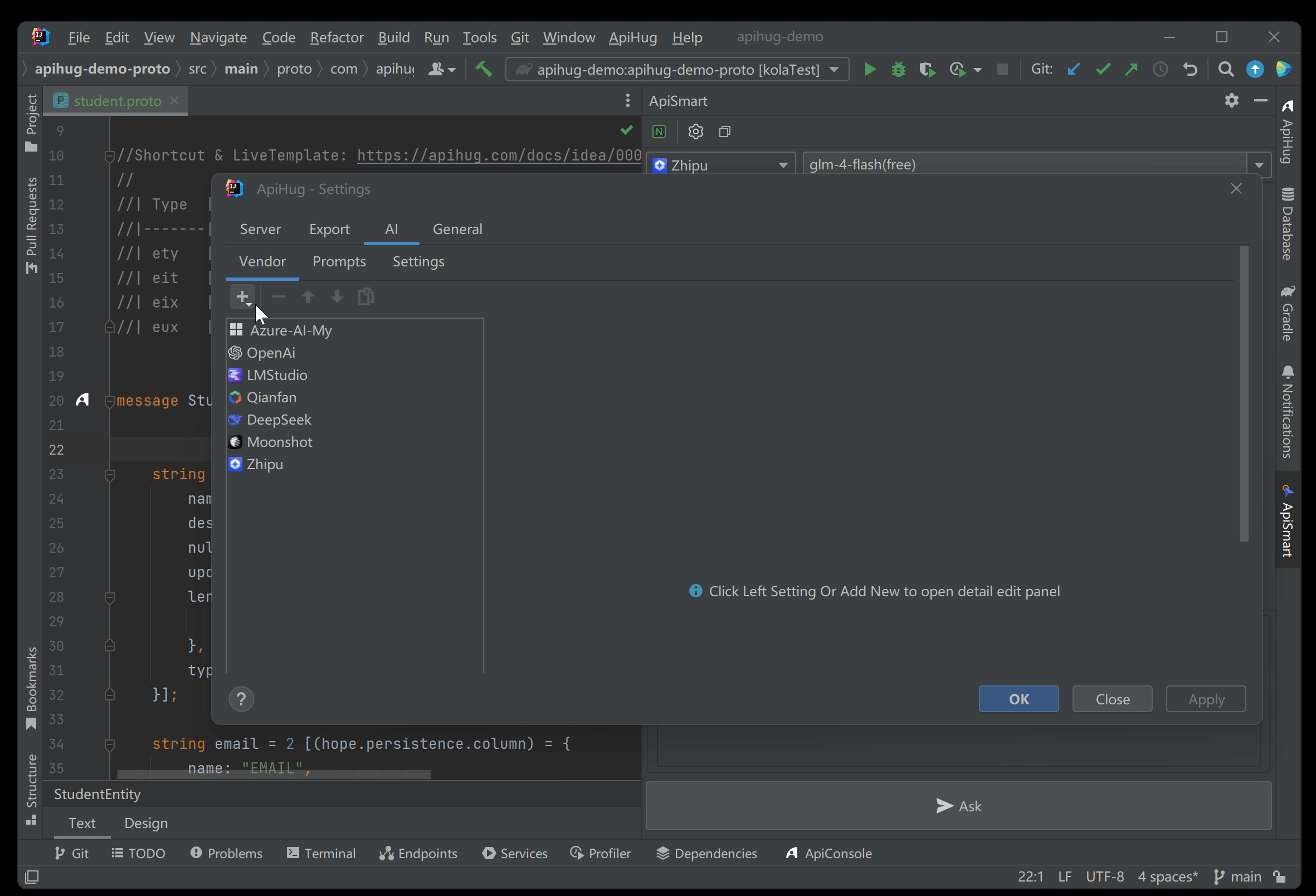
- Copilot
- ApiSmart Settings
Copilot
ApiSmart Settings
ApiSmart Settings & Support Vendors
ApiHug’s ApiSmart leverage the Langchain4j to talk to the LLM vendors; so basically any Langchain4j support vendor can be support by ApiSmart;
But now as limitation of our capacity; we need to add and test one by one; this will take some time;
Eventually all of them can be in our support list.
Toolbar>ApiHug>Settings>AI
Settings
Toolbar>ApiHug>Settings>AI>Settings
Common LLM runtime settings, all of them has default value, no need to specify if keep default.
| Name | Comment | Mandatory |
|---|---|---|
| Chat Memory Size | Memory window size, default 10 | Y |
| Top-P | Top-P is a text generation method that focuses on the most likely tokens until a cumulative probability threshold is reached. It helps balance diversity and certainty in generated text. Use it with care, adjusting it for desired outcomes. | Y |
| Max Output Tokens | Maximum attempts | Y |
| Timeout(s) | Time out in second | Y |
| Max Attempts | Max attempts | Y |
| Temperature | What sampling temperature to use, between 0 and 2. Higher values like 0.8 will make the output more random, while lower values like 0.2 will make it more focused and deterministic. | Y |
| Stream | Support stream | Y |
| System Prompt | System prompt | Y |
| Show Detail | Show time or token cost etc | Y |
Vendors
Support List:
- Open AI
- Azure
- Gemini
- Anthropic
- DeepInfra
- Mooshot
- Zhipu
- DeepSeek
- Qianfan
- Grop
- Ollama
- Mistral
- LMStudio
- OpenRouter
- Jan
- GPT4All
- Tongyi(Aliyun)通义-阿里
- Hunyuan(Tencent)混元-腾讯
Any other suppliers that support the OpenAI-style API can integrate seamlessly.
Toolbar>ApiHug>Settings>AI>Vendor
In theory language-models is the full list;
ApiSmart support you configure multiple instance for one LLM vendor, like for different env;
so each setting will have a specific name and description, you should make them straightforward for example Openai-test-env will be a good sample.
| Name | Comment | Mandatory |
|---|---|---|
| Name | Name of this LLM configuration | Y |
| Description | Description of this LLM configuration | N |
OpenAI
| Name | Comment | Mandatory |
|---|---|---|
| URL | https://api.openai.com/ as default | N |
| Api Key | Key for the API | Y |
| Project Id | Not used yet | N |
| Organization | Not used yet | N |
Azure AI
| Name | Comment | Mandatory |
|---|---|---|
| URL | https://***.openai.azure.com/ like endpoint | Y |
| Api Key | Key for the API | Y |
| Model | Default Model name(deployment), you can put manually on runtime | N |
LLM Studio
| Name | Comment | Mandatory |
|---|---|---|
| URL | http://localhost:1234/v/1/ default local URL | Y |
lmstudio Discover, download, and run local LLMs
Local LLM Server, You can serve local LLMs from LM Studio’s Developer tab, either on localhost or on the network.
Jan
| Name | Comment | Mandatory |
|---|---|---|
| URL | https://***.openai.azure.com/ like endpoint | Y |
OpenRouter
TBD
| Name | Comment | Mandatory |
|---|---|---|
| URL | https://***.openai.azure.com/ like endpoint | Y |
| Api Key | Key for the API | Y |
| Model | Default Model name(deployment), you can put manually on runtime | N |
Qianfan
| Name | Comment | Mandatory |
|---|---|---|
| Api Key | Key for the API | Y |
| Secret Key | Secret Key for the API | Y |
| Model | default model, you can input manually during runtime | Y |
BTW Yi-34B-Chat is free;
Zhipu

| Name | Comment | Mandatory |
|---|---|---|
| Api Key | Key for the API | Y |
| Model | default model, you can input manually during runtime | Y |
TBD
- …
Prompt
Toolbar>ApiHug>Settings>AI>Prompt
| Name | Comment | Mandatory |
|---|---|---|
| name | shortcut style, can be refer /{name} when ask, /explain is a good example | Y |
| prompt | body of the prompt | Y |
⚠️Ensure name is short, unique, and easily recognizable⚠️
The quality of prompt words directly affects the effectiveness of the answers produced by large models;
this is a task that requires patience and experience!
If you don’t ask good questions, of course, you won’t get good answers.
Prompt engineering is a relatively new discipline for developing and optimizing prompts to efficiently use language models (LMs) for a wide variety of applications and research topics.
Prompt engineering skills help to better understand the capabilities and limitations of large language models (LLMs).
We will collect some tips here: apismart prompts
ApiHug api/ prompt (apismart-prompts/api):
As a seasoned ApiHug developer, you’ll design API endpoints using ApiHug’s Protocol Buffers-based DSL.
Here is an example of a Proto definition using ApiHug:
syntax = "proto3";
package com.apihug.sample;
import "extend/domain.proto";
import "google/protobuf/empty.proto";
import "swagger/annotations.proto";
service SampleService {
option (hope.swagger.svc) = {
path: "/sample";
description: "Service for Sample";
tag:{
name: "demo"
description: "all demo apis"
}
};
rpc ExampleSayHello (google.protobuf.Empty) returns (google.protobuf.Empty) {
option (hope.swagger.operation) = {
get: "/hello-world";
description: "Say hello to the world";
tags: "project";
pageable: true;
input_plural: true;
out_plural: false;
priority: HIGH;
//only include this part, when you really need pass parameters
parameters:{
parameter:{
name: "name";
in: QUERY;
schema:{
format: STRING;
blank: FALSE
}
}
}
//only include this part, when you need authorization
authorization:{
//low_limit_risky_mode: LOGIN
rbac:{
roles: {
roles: 'USER_ADD'
}
}
}
};
};
}
Basic Tips
hope.swagger.svc
Specify the base path, description, and tags for your service.
hope.swagger.operation
Specify HTTP method, summary, and parameters with the Operation message. Omit bool properties with default false.
message Operation {
repeated string tags = 1;
string summary = 2;
string description = 3;
map<string, Response> responses = 9;
repeated Scheme schemes = 10;
bool deprecated = 11;
Priority priority = 14; //LOW,MIDDE,HIGH,CRITICAL,FATAL
string request_name = 15;
optional bool pageable = 51; //Pageable request and response, default false
optional bool raw = 52; //keep raw response
optional bool request = 53;
optional bool input_plural = 56; //Input is a List, only set when need
optional bool out_plural = 57; //Output is a list, only set when need
optional Parameters parameters = 100;
oneof pattern {
string get = 302;
string put = 303;
string post = 304;
string delete = 305;
string patch = 306;
}
optional Authorization authorization = 402;
bool body_empty = 600;
repeated string questions = 800; //Tips for AI prompt for this operation
}authorization
Set API security and authorization with Authorization messages, avoiding OAS methods in favor of the ApiHug approach.
message RBAC {
enum Combinator {
AND = 0;
OR = 1;
}
enum PredefinedRoleCheckerType {
NA = 0 [deprecated = true];
PLATFORM = 1;
PLATFORM_MANAGER = 2;
PLATFORM_OWNER = 3;
TENANT = 4;
TENANT_MANAGER = 5;
TENANT_OWNER = 6;
}
message Roles {
repeated string roles = 1;
}
oneof role {
PredefinedRoleCheckerType predefined_role_checker = 3;
Roles roles = 2;
}
message Authorization {
enum LowLimitRiskyMode {
ANONYMOUS = 0;
LOGIN = 1;
ACTIVE = 2;
}
oneof kind {
LowLimitRiskyMode low_limit_risky_mode = 1;
RBAC rbac = 2;
string expression = 15;
}
}parameters
- Use
ParametersandParameterto define API parameters and responses. - Omit parameter definitions if not required, especially for POST requests where input and output are specified in the rpc method.
message Parameters {
repeated Parameter parameter = 1;
}
message Parameter {
enum IN {
QUERY = 0;
HEADER = 1;
PATH = 2;
COOKIE = 3;
SESSION = 4;
}
string name = 1;
IN in = 2;
JSONSchema schema = 10;
hope.common.BoolType plural = 20;
}RPC returns or input
Define the JSON schema for your API using the JSONSchema message. This includes details like the title, description, and format of the schema.
enum JSONSchemaFormat {
//Not used, default to string or the explicit type of the field in the message
UNKNOWN = 0;
//what we care about
//same: `format = bool`
BOOLEAN = 4;
//same: `format = int32`
INTEGER = 5;
//same: `format = double`
DOUBLE = 6;
STRING = 7;
//same: `format = float`
FLOAT = 8;
//same: `format = big-decimal`
BIG_DECIMAL = 9;
//same: `format = int64`
LONG = 10;
//same: `format = date`
DATE = 11;
//same: `format = date-time`
DATE_TIME = 12;
//same: `format = time`
TIME = 13;
//same: `format = uuid`
UUID = 14;
//same: `format = password`
PASSWORD = 15;
//same: `format = email`
EMAIL = 16;
//same: `format = binary`
BINARY = 17;
}
message JSONSchema {
string ref = 3;
string title = 5;
string description = 6;
string default = 7;
bool read_only = 8;
string example = 9;
google.protobuf.DoubleValue multiple_of = 10;
google.protobuf.DoubleValue maximum = 11;
hope.common.BoolType exclusive_maximum = 12;
google.protobuf.DoubleValue minimum = 13;
hope.common.BoolType exclusive_minimum = 14;
google.protobuf.UInt64Value max_length = 15;
google.protobuf.UInt64Value min_length = 16;
string pattern = 17;
google.protobuf.UInt64Value max_items = 20;
google.protobuf.UInt64Value min_items = 21;
hope.common.BoolType unique_items = 22;
google.protobuf.UInt64Value max_properties = 24;
google.protobuf.UInt64Value min_properties = 25;
repeated string required = 26;
repeated string array = 34;
JSONSchemaFormat format = 36;
repeated string enum = 46;
FieldConfiguration field_configuration = 1001;
hope.common.BoolType empty = 48;
hope.common.BoolType blank = 49;
hope.common.BoolType assert = 1011;
string decimal_max = 1012;
string decimal_min = 1013;
google.protobuf.Int32Value digits_integer = 1014;
google.protobuf.Int32Value digits_fraction = 1015;
hope.common.BoolType email = 1016;
optional TimeConstraintType time_constraint_type = 1017;
oneof format_of_date {
DateFormat date_format = 1018;
string customized_date_format = 1019;
}
optional mock.Mock mock = 1020;
}This is a Sample:
message SampleRequest {
option (hope.swagger.schema) = {
json_schema: {
description: "A sample plain object definition";
};
};
uint64 age = 1 [(hope.swagger.field) = {
description: "age of human";
example: "Example of this field";
empty: FALSE;
}];
string name = 2 [(hope.swagger.field) = {
description: "name of a chinese people";
mock:{
chinese_name_rule:{
type: NAME
}
}
}];
}Date Formats
Define date formats using the DateFormat enum for consistency across your API.
enum DateFormat {
BASIC_ISO_DATE = 0;
ISO_LOCAL_DATE = 1;
ISO_TIME = 2;
ISO_LOCAL_TIME = 3;
ISO_LOCAL_DATE_TIME = 7;
YYYY_MM_DD_HH_MM_SS = 15;
YYYY_MM_DD_HH_MM_SS_SSS = 16;
SLASH_YYYY_MM_DD = 17;
SLASH_YYYY_MM_DD_HH_MM_SS = 18;
SLASH_YYYY_MM_DD_HH_MM_SS_SSS = 19;
HH_MM = 20;
}Standards Compliance
- Use proto3 syntax for all protocol buffer definitions.
- Ensure precise and meaningful names and descriptions in API definitions.
- Adhere strictly to the ApiHug and OpenAPI specification.
END


